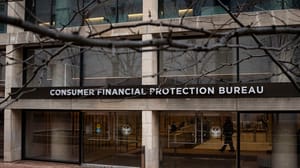CFP Board Hires Former SEC Veteran as Enforcement ChiefCFP Board Hires Former SEC Veteran as Enforcement Chief
Thomas A. Sporkin will join the board in January as the managing director, enforcement, and will be tasked with modernizing the board's detection, investigation and prosecution processes.

The CFP Board is adding to its enforcement emphasis with the addition of securities attorney and SEC veteran Thomas A. Sporkin as managing director for enforcement, where he’ll head a team of attorneys and legal support staff to “modernize” the board’s detection, investigation and prosecution activities.
CFP Board CEO Kevin Keller said the process of filling the new role began with about 100 candidates, before being whittled down to three, with Sporkin selected as the final choice. Keller said Sporkin’s breadth of experience, including his 20 years with the commission, made him ideally suited for the newly formed position.
“There’s the progressively successful leadership role at the SEC, and in his time he was responsible for enforcement, but his time in private practice has given him the experience of working with people accused of potentially violating SEC rules,” he said. “So he’s got both sides, and I think that makes him a stronger candidate.”
At the SEC, Sporkin worked in the Enforcement Division, including nine years as deputy chief for the Office of Internet Enforcement and more than two years as chief of the Office of Market Intelligence. During his tenure he supervised investigations into financial reporting, stock options backdating, the Foreign Corrupt Practices Act and internet-related securities fraud, among other issues. Additionally, Sporkin helped establish the SEC’s Whistleblower Office and assisted in writing the whistleblower rules originally mandated by the 2010 Dodd-Frank Act.
Sporkin left the SEC in 2012 for Buckley LLP, where he focused on enforcement defense, compliance counseling, internal investigations and private litigation, according to the firm’s biography page for the attorney. In addition to his roles at Buckley and the SEC, Sporkin has also taught securities law at both George Mason’s Antonin Scalia Law School and the Catholic University of America’s Columbus School of Law.
The new position is part of an effort to separate the detection, investigation and prosecution functions of the CFP Board’s enforcement process from the board’s adjudication, appeals and arbitration process, Keller said. In this amended approach, Sporkin’s team will investigate and determine whether there’s been a potential violation or noncompliance of CFP standards, and present those findings to the board’s Disciplinary and Ethics Commission. This group, headed by the board’s general counsel, will then determine whether there has indeed been a violation and if sanctions are appropriate.
Enforcement at the CFP Board has been a source of conversation for several years; earlier this year, the board enacted several reforms to its governance practices following an internal review of an independent task force report released late last year examining the board’s enforcement procedures. The board revised its term policies for members and also announced it would no longer solely rely on self-disclosure by CFP professionals concerning their disciplinary history.
Keller touted the CFP Board certification as being among the most well regarded on FINRA’s list of professional designations and said it was in large part due to the fact that the board takes its code of standards seriously.
“And the public knows that, and it’s why the public increasingly seeks out a CFP individual,” he said. “The overall goal in committing additional resources to enforcement is to make CFP certification even more credible to the public.”
Sporkin will begin work at the CFP Board on January 4, 2021.







